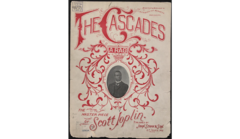Scott Joplin's "The Cascades" and the St. Louis World's Fair
Thursday, March 30, 2017

When you think of Scott Joplin (1867 or 1868-1917), a piano rag probably comes to mind rather than a piece for piano plus strings, winds, and percussion—but the latter is precisely the instrumentation of the only work in the RISM database by Joplin, who died 100 years ago on April 1.
The Joplin piece in RISM is an orchestral arrangement of “The Cascades” (RISM ID no. 702010162). The original piano rag, which was once advertised by Joplin’s publisher as being “as high-class as Chopin,” was composed upon the occasion of the World’s Fair in St. Louis in 1904. This World’s Fair was known as the Louisiana Purchase Exposition and celebrated the centennial of the historic event that doubled the size of the United States and launched an age of exploration and Western expansion. The fair, which attracted an estimated 20 million people from around the world, encouraged visitors to look back to the nation’s frontier days while looking ahead to progress in the fields of technology, science, and medicine. Exhibits from fifty foreign countries and almost all of the states ensured that fairgoers had a good time.
The “cascades” of Joplin’s title were part of “the most beautiful feature of the Exhibition,” as a souvenir photo book from the fair phrased it. Fourteen waterfalls flowed into a basin in front of the fair’s centerpiece, Festival Hall, with the Colonnade of States surrounding it. Festival Hall was the fair’s main venue for music performances and housed the world’s largest pipe organ at the time. Joplin probably visited the fair when it opened, and the “Cascades” rag could often be heard there.
Listening to the piece, you can almost hear the water splashing as the cascades flow down—or you might hear structural and harmonic similarities to Joplin’s earlier success, the “Maple Leaf Rag.”
RISM’s copy of “The Cascades” was arranged by Etilmon J. Stark (1868-1962) and published in 1905. “Till” was the son of Joplin’s publisher, John Stark, who issued about a third of Joplin’s output. In a 1914 issue of the monthly journal Christiansen’s Ragtime Review, a short, fictional dialogue by John Stark is included in which a listener is mesmerized by an orchestra playing “The Cascades.” Was our arrangement the same one that the imaginary listeners heard? Today the parts are held by the Koninklijke Muziekmaatschappij Casino in Tongeren, Belgium (B-TOekmc), a music society with a history that goes back over 250 years.
A number of events throughout the United States will mark the Joplin centennial, including a concert at Carnegie Hall by Richard Dowling of all of Joplin’s piano works, a concert in Joplin’s hometown of Texarkana, the annual International Ragtime Festival in Sedalia, Missouri, and a concert at Joplin’s final resting place, St. Michael’s Cemetery in New York.
Image: Cover to “The Cascades” by Scott Joplin (St. Louis: John Stark, 1904). From the Library of Congress’s sheet music collection.
Sources: Edward A. Berlin, King of Ragtime: Scott Joplin and his Era (New York: Oxford University Press, 1994).
Berlin, “Joplin, Scott.” Grove Music Online. Oxford Music Online. Oxford University Press.
Missouri Historical Society, “The 1904 World’s Fair: Looking Back at Looking Forward.”
Share Tweet EmailCatégorie: Anniversaires

